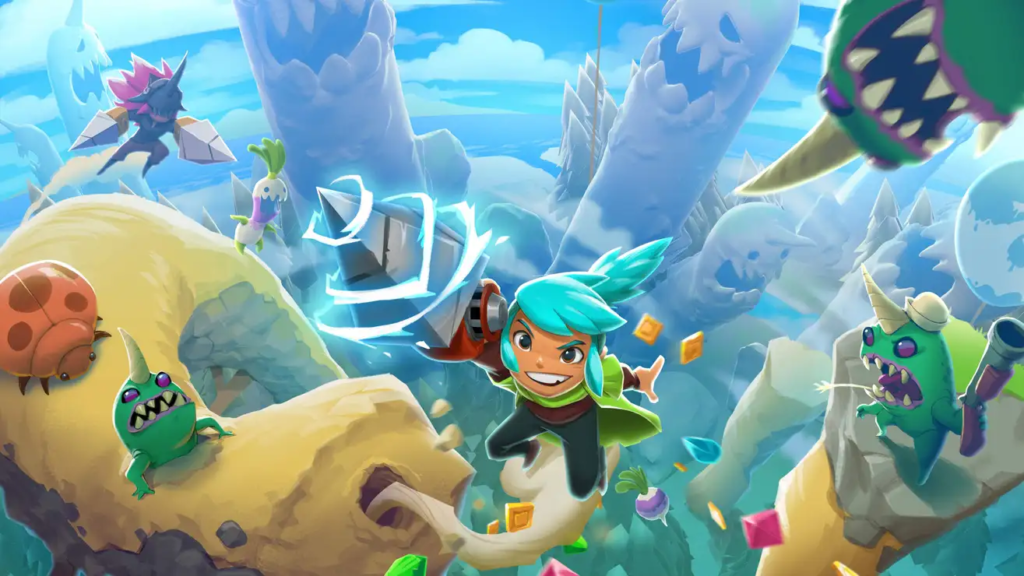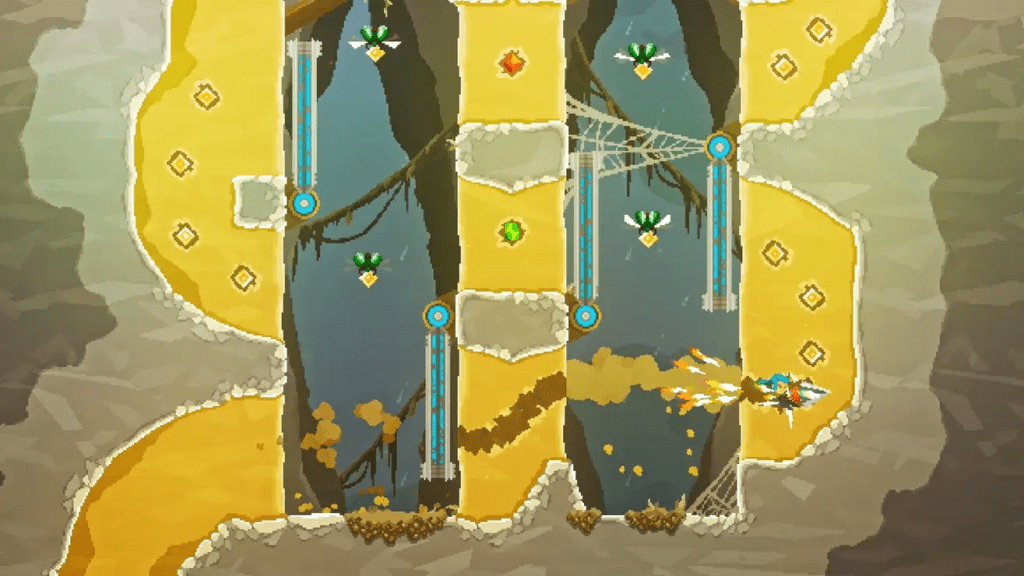
To reach Pepper Grinder’s greatest portions, you have to dig deep, and before you know it, it’s done.
I was immediately struck by Pepper Grinder’s seeming boldness when I first saw it. It felt as like it was drawing on a type of anarchy that other, more sterilized platformers shunned. It was this loud, energetic, even combustible game. Most importantly, it did this by giving the player a big drill and telling them to screw everything up. At last, a game that made sense to me. The high-octane platforming, digging, and controlled chaos that Pepper Grinder promises is mostly fulfilled, although it takes some time to reach the game’s best parts and ends too soon.
Your character wakes up on the shore of a goblin-infested region at the start of Pepper Grinder. With lightning speed, you’re given the biggest drill ever made and set free on the throng. You get a grappling hook, learn how to dig, and acquire a number of drill attachments that drastically change your capabilities, such as a machine gun and, eventually, a mech. Pepper Grinder has a modest beginning before blowing out into a crazy, boisterous trip. Essentially, though, this is a platformer centered around one fantastic mechanic, which it happily does quite well.
The action of the Pepper Grinder is a major factor in why it functions so well. Over the course of the game’s four hours, the ability to dig into some surfaces and then shoot yourself out the other end never gets old. I believe I spent more time below ground than above it, and I hardly ever took my finger off the trigger that started the drill. It became second nature to drill and flow through the earth as if it were water, and Pepper Grinder’s best features thrive on it. Easily one of the most exciting stages I’ve played this year, my favorite stage is a bonus level in the third planet that simply asks you to maintain your momentum while you fly between falling pieces of ice down one long corridor. Pepper Grinder is an exciting platformer that tests your ability to remain composed in the midst of turmoil while going deep into the fundamentals of dopamine dispensing.
Strangely enough, Pepper Grinder’s worst flaw is also one of its advantages: it’s brief. I felt like a seasoned pro by the time I reached the back half because the first few planets and stages laid out the framework sufficiently. Pepper Grinder takes so long guiding you through the process that, when it comes time to add further layers, it feels a touch reluctant. The game moves quickly on to the next mechanic as soon as one is introduced, such as sprinklers that create rapidly dissolving platforms in magma. This prevents you from experiencing the thrilling evolution that some games like this one occasionally provide, where new elements work together to create a sense of constant change and escalation. Despite an intense last act and some crowd-pleasing set pieces in the conclusion, the game finishes before there is a single “a-ha” moment where everything finally clicks.

While some of Pepper Grinder’s mechanics and detours feel complementary, others—especially when combat is involved—feel a little bit unstable. Rarely is there a stage where you have to devise a complex strategy and attack plan, but sometimes you’ll get a gun attachment that turns the game into a side-scrolling shooter. Although it undoubtedly stirs things up, making you a semi-stationary turret goes against the game’s advantages. This actually applies to the majority of Pepper Grinder’s “combat,” which is rather light-hearted throughout and frequently ends before you realize it because most foes can be defeated with just a quick drill stroke and a target pointed at. To be honest, it seems like a bit of a post-mortem.
Most of the time, in order to go through a level, you’ll have to push yourself out of the ground—sometimes with a boost connected to one of the face buttons—and basically trample over flying sentries, ground-based bugs, and the lone goblin miner. At other times, the game’s momentum is stopped for a dull encounter when all I want to do is zoom through as fast and effectively as possible, and you’ll be stuck in an area until you destroy these nests that generate opponents. Enemies don’t always feel like distinct obstacles; instead, they often feel like another surface that you have to drill through.
With the exception of the incredibly uneven first boss fight, Pepper Grinder’s boss fights are decent encounters that attempt to refute that idea while also serving as a reminder that the game works best when it asks the player to do anything other than fight. For instance, the kinetic passage in the third world before the boss fight is thrilling. But the conflict that ends the chapter doesn’t live up to the build-up. The game’s boss fights are tedious in the early and end moments, but the ones in the middle seem like respectable attempts to better integrate movement and fighting. Combat in Pepper Grinder can be described as a bit of a mixed bag, to use an irritating game writer’s cliché that feels somewhat accurate in this instance.
In the end, Pepper Grinder is a fantastic little platformer to pass a beautiful afternoon or evening playing, with a really gratifying four-hour length. It feels so good to just move in the game that I have restarted it to play one of its bite-sized levels—something I hardly ever do, let alone one I’m evaluating. to delve. to pound. With the possible exception of the grand conclusion, I doubt I’ll go through any of Pepper Grinder’s action-packed levels again, but that doesn’t mean there aren’t plenty of things it gets wrong. All I could ask is that more of what was effective be distributed.
Pepper Grinder is currently playable on the Switch and PC.

